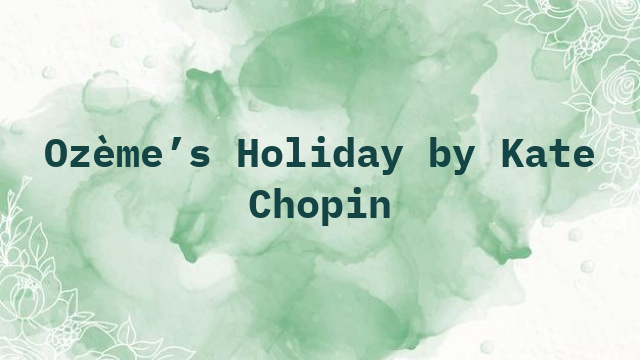
Ozème’s Holiday by Kate Chopin
OZÈME often wondered why there was not a special dispensation of providence to do away with the necessity for work. There seemed to him so much created for man’s enjoyment in this world, and so little time and opportunity to profit by it. To sit and do nothing but breathe was a pleasure to Ozème; but to sit in the company of a few choice companions, including a sprinkling of ladies, was even a greater delight; and the joy which a day’s hunting or fishing or picnicking afforded him is hardly to be described. Yet he was by no means indolent. He worked faithfully on the plantation the whole year long, in a sort of methodical way; but when the time came around for his annual week’s holiday, there was no holding him back. It was often decidedly inconvenient for the planter that Ozème usually chose to take his holiday during some very busy season of the year.
He started out one morning in the beginning of October. He had borrowed Mr. Laballière’s buckboard and Padue’s old gray mare, and a harness from the negro Severin. He wore a light blue suit which had been sent all the way from St. Louis, and which had cost him ten dollars; he had paid almost as much again for his boots; and his hat was a broad-rimmed gray felt which he had no cause to be ashamed of. When Ozème went “broading,” he dressed-well, regardless of cost. His eyes were blue and mild; his hair was light, and he wore it rather long; he was clean shaven, and really did not look his thirty-five years.
Ozème had laid his plans weeks beforehand. He was going visiting along Cane River; the mere contemplation filled him with pleasure. He counted upon reaching Fédeaus’ about noon, and he would stop and dine there. Perhaps they would ask him to stay all night. He really did not hold to staying all night, and was not decided to accept if they did ask him. There were only the two old people, and he rather fancied the notion of pushing on to Beltrans’, where he would stay a night, or even two, if urged. He was quite sure that there would be something agreeable going on at Beltrans’, with all those young people-perhaps a fish-fry, or possibly a ball!
Of course he would have to give a day to Tante Sophie and another to Cousine Victoire; but none to the St. Annes unless entreated-after St. Anne reproaching him last year with being a faineant for broading at such a season! At Cloutierville, where he would linger as long as possible, he meant to turn and retrace his course, zigzagging back and forth across Cane River so as to take in the Duplans, the Velcours, and others that he could not at the moment recall. A week seemed to Ozème a very, very little while in which to crowd so much pleasure.
There were steam-gins at work; he could hear them whistling far and near. On both sides of the river the fields were white with cotton, and everybody in the world seemed busy but Ozème. This reflection did not distress or disturb him in the least; he pursued his way at peace with himself and his surroundings.
At Lamérie’s cross-roads store, where he stopped to buy a cigar, he learned that there was no use heading for Fédeaus’, as the two old people had gone to town for a lengthy visit, and the house was locked up. It was at Fédeaus’ that Ozème had intended to dine.
He sat in the buckboard, given up to a moment or two of reflection. The result was that he turned away from the river, and entered the road that led between two fields back to the woods and into the heart of the country. He had determined upon taking a short cut to the Beltrans’ plantation, and on the way he meant to keep an eye open for old Aunt Tildy’s cabin, which he knew lay in some remote part of this cut-off. He remembered that Aunt Tildy could cook an excellent meal if she had the material at hand. He would induce her to fry him a chicken, drip a cup of coffee, and turn him out a pone of corn-bread, which he thought would be sumptuous enough fare for the occasion.
Aunt Tildy dwelt in the not unusual log cabin, of one room, with its chimney of mud and stone, and its shallow gallery formed by the jutting of the roof. In close proximity to the cabin was a small cotton-field, which from a long distance looked like a field of snow. The cotton was bursting and overflowing foam-like from bolls on the drying stalk. On the lower branches it was hanging ragged and tattered, and much of it had already fallen to the ground. There were a few chinaberry-trees in the yard before the hut, and under one of them an ancient and rusty-looking mule was eating corn from a wood trough. Some common little Creole chickens were scratching about the mule’s feet and snatching at the grains of corn that occasionally fell from the trough.
Aunt Tildy was hobbling across the yard when Ozème drew up before the gate. One hand was confined in a sling; in the other she carried a tin pan, which she let fall noisily to the ground when she recognized him. She was broad, black, and misshapen, with her body lent forward almost at an acute angle. She wore a blue cottonade of large plaids, and a bandana awkwardly twisted around her head.
“Good God A’mighty, man! Whar you come from?” was her startled exclamation at beholding him.
“F’om home, Aunt Tildy; w’ere else do you expec’?” replied Ozème, dismounting composedly.
He had not seen the old woman for several years-since she was cooking in town for the family with which he boarded at the time. She had washed and ironed for him, atrociously, it is true, but her intentions were beyond reproach if her washing was not. She had also been clumsily attentive to him during a spell of illness. He had paid her with an occasional bandana, a calico dress, or a checked apron, and they had always considered the account between themselves square, with no sentimental feeling of gratitude remaining on either side.
“I like to know,” remarked Ozème, as he took the gray mare from the shafts, and led her up to the trough where the mule was-“I like to know w’at you mean by makin’ a crop like that an’ then lettin’ it go to was’e? Who you reckon’s goin’ to pick that cotton? You think maybe the angels goin’ to come down an’ pick it to’ you, an’ gin it an’ press it, an’ then give you ten cents a poun’ fo’ it, hein?”
“Ef de Lord don’ pick it, I don’ know who gwine pick it, Mista Ozème. I tell you, me an’ Sandy we wuk dat crap day in an’ day out; it’s him done de mos’ of it.”
“Sandy? That little-“
“He ain’ dat li’le Sandy no ma’ w’at you rec’lec’s; he ‘mos’ a man, an’ he wuk like a man now. He wuk mo’ ‘an fittin’ to’ his strenk, an’ now he layin’ in dab sick-God A’mighty knows how sick. An’ me wid a risin’ twell I bleeged to walk de flo’ o’ nights. an’ don’ know ef I ain’ gwine to lose de han’ after all.”
“W’y, in the name o’ conscience, you don’ hire somebody to pick?”
“Whar I got money to hire? An’ you knows well as me ev’y chick an’ chile is pickin’ roun’ on de plantations an’ gittin’ good pay.”
The whole outlook appeared to Ozème very depressing, and even menacing, to his personal comfort and peace of mind. He foresaw no prospect of dinner unless he should cook it himself. And there was that Sandy-he remembered well the little scamp of eight, always at his grandmother’s heels when she was cooking or washing. Of course he would have to go in and look at the boy, and no doubt dive into his traveling-bag for quinine, without which he never traveled.
Sandy was indeed very ill, consumed with fever. He lay on a cot covered up with a faded patchwork quilt. His eyes were half closed, and he was muttering and rambling on about hoeing and bedding and cleaning and thinning out the cotton; he was hauling it to the gin, wrangling about weight and bagging and ties and the price offered per pound. That bale or two of cotton had not only sent Sandy to bed, but had pursued him there, holding him through his fevered dreams, and threatening to end him. Ozème would never have known the black boy, he was so tall, so thin, and seemingly so wasted, lying there in bed.
“See yere, Aunt Tildy,” said Ozème, after he had, as was usual with him when in doubt, abandoned himself to a little reflection; “between us-you an’ me-we got to manage to kill an’ cook one o’ those chickens I see scratchin’ out yonda, fo’ I’m jus’ about starved. I reckon you ain’t got any quinine in the house? No; I didn’t suppose an instant you had. Well, I’m goin’ to give Sandy a good dose o’ quinine to-night, an’ I’m goin’ stay an’ see how that’ll work on ‘im. But sun-up, min’ you, I mus’ get out o’ yere.”
Ozème had spent more comfortable nights than the one passed in Aunt Tildy’s bed, which she considerately abandoned to him.
In the morning Sandy’s fever was somewhat abated, but had not taken a decided enough turn to justify Ozème in quitting him before noon, unless he was willing “to feel like a dog,” as he told himself. He appeared before Aunt Tildy stripped to the undershirt, and wearing his second-best pair of trousers.
“That’s a nice pickle o’ fish you got me in, ol’ woman. I guarantee, nex’ time I go abroad, ’tain’t me that’ll take any cut-off. W’ere’s that cotton-basket an’ cotton-sack o’ yo’s?”
“I knowed it!” chanted Aunt Tildy-“I knowed de Lord war gwine sen’ somebody to holp me out. He war n’ gwine let de crap was’e atter he give Sandy an’ me de strenk to make hit. De Lord gwine shove you ‘long de row, Mista Ozème. De Lord gwine give you plenty mo’ fingers an’ han’s to pick dat cotton nimble an’ clean.”
“Neva you min’ w’at the Lord’s goin’ to do; go get me that cotton-sack. An’ you put that poultice like I tol’ you on yo’ han’, an’ set down there an’ watch Sandy. It looks like you are ’bout as helpless as a’ ol’ cow tangled up in a potato-vine.”
Ozème had not picked cotton for many years, and he took to it a little awkwardly at first; but by the time he had reached the end of the first row the old dexterity of youth had come back to his hands, which flew rapidly back and forth with the motion of a weaver’s shuttle; and his ten fingers became really nimble in clutching the cotton from its dry shell. By noon he had gathered about fifty pounds. Sandy was not then quite so well as he had promised to be, and Ozème concluded to stay that day and one more night. If the boy were no better in the morning, he would go off in search of a doctor for him, and he himself would continue on down to Tante Sophie’s; the Beltrans’ was out of the question now.
Sandy hardly needed a doctor in the morning. Ozème’s doctoring was beginning to tell favorably; but he would have considered it criminal indifference and negligence to go away and leave the boy to Aunt Tildy’s awkward ministrations just at the critical moment when there was a turn for the better; so he stayed that day out, and picked his hundred and fifty pounds.
On the third day it looked like rain, and a heavy rain just then would mean a heavy loss to Aunt Tildy and Sandy, and Ozème again went to the field, this time urging Aunt Tildy with him to do what she might with her one good hand.
“Aunt Tildy,” called out Ozème to the bent old woman moving ahead of him between the white rows of cotton, “if the Lord gets me safe out o’ this ditch, ‘t ain’t to-morro’ I’ll fall in anotha with my eyes open, I bet you.”
“Keep along, Mista Ozème; don’ grumble, don’ stumble; de Lord’s a-watchin’ you. Look at yo’ Aunt Tildy; she doin’ mo’ wid her one han’ ‘an you doin’ wid yo’ two, man. Keep right along, honey. Watch dat cotton how it fallin’ in yo’ Aunt Tildy’s bag.”
“I am watchin’ you, ol’ woman; you don’ fool me. You got to work that han’ o’ yo’s spryer than you doin’, or I’ll take the rawhide. You done fo’got w’at the rawhide tas’e like, I reckon”-a reminder which amused Aunt Tildy so powerfully that her big negro-laugh resounded over the whole cotton-patch, and even caused Sandy, who heard it, to turn in his bed.
The weather was still threatening on the succeeding day, and a sort of dogged determination or characteristic desire to see his undertakings carried to a satisfactory completion urged Ozème to continue his efforts to drag Aunt Tildy out of the mire into which circumstances seemed to have thrust her.
One night the rain did come, and began to beat softly on the roof of the old cabin. Sandy opened his eyes, which were no longer brilliant with the fever flame. “Granny,” he whispered, “de rain! Des listen, granny; de rain a-comin’, an’ I ain’ pick dat cotton yit. W’at time it is? Gi’ me my pants-I got to go-“
“You lay whar you is, chile alive. Dat cotton put aside clean and dry. Me an’ de Lord an’ Mista Ozème done pick dat cotton.”
Ozème drove away in the morning looking quite as spick and span as the day he left home in his blue suit and his light felt drawn a little over his eyes.
“You want to take care o’ that boy,” he instructed Aunt Tildy at parting, “an’ get ‘im on his feet. An’, let me tell you, the nex’ time I start out to broad, if you see me passin’ in this yere cut-off, put on yo’ specs an’ look at me good, because it won’t be me; it’ll be my ghos’, ol’ woman.”
Indeed, Ozème, for some reason or other, felt quite shamefaced as he drove back to the plantation. When he emerged from the lane which he had entered the week before, and turned into the river road, Lamérie, standing in the store door, shouted out:
“He, Ozème! you had good times yonda? I bet you danced holes in the sole of them new boots.”
“Don’t talk, Lamérie!” was Ozème’s rather ambiguous reply, as he flourished the remainder of a whip over the old gray mare’s sway-back, urging her to a gentle trot.
When he reached home, Bode, one of Padue’s boys, who was assisting him to unhitch, remarked:
“How come you didn’ go yonda down de coas’ like you said, Mista Ozème? Nobody didn’ see you in Cloutierville, an’ Mailitt say you neva cross’ de twenty-fo’-mile ferry, an’ nobody didn’ see you no place.”
Ozème returned, after his customary moment of reflection:
“You see, it’s ‘mos’ always the same thing on Cane riva, my boy; a man gets tired o that a la fin. This time I went back in the woods, ‘way yonda in the Fédeau cut-off kin’ o’ campin’ an’ roughin’ like, you might say. I tell you, it was sport, Bode.”




